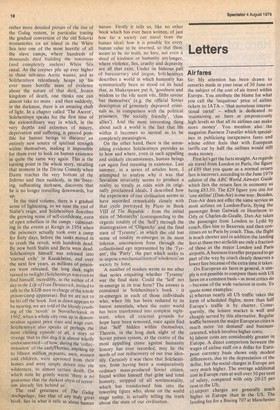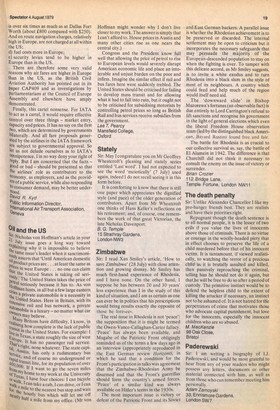Air fares
Sir: My attention has been drawn to remarks made in your issue of 30 June on the subject of the cost of air travel within Europe, You attribute the blame for what you call the 'iniquitous' price of airline tickets to IATA — 'that notorious international cartel' — which is dedicated to 'maintaining air fares at preposterously high levels so that all its airlines can make more money'. You mention also the magazine Business Traveller which specialises in publicising inexpensive fares and whose editor feels that with European tariffs cut by half the airlines would still make money. First let's get the facts straight. As regards air travel from London to Paris, the figure of £89 that you quote as a normal return ' fare is incorrect, according to the June 1979 edition of the ABC World Airways Guide which lists the return fare in economy as being £83.50. The £29 figure you cite for 'one airline' (Dan-Air) is one way. Besides, Dan-Air does not offer the same service as most airlines on London-Paris, flying the passenger from Gatwick or Heathrow to Orly or Charles-de-Gaulle. Dan-Air takes the passenger from London to Lydd by coach, flies him to Beauvais, and then continues on to Paris by coach. Thus, the flight is much shorter and in addition the landing fees at these two airfields are only a fraction of those at the major London and Paris airports. A business traveller prepared to go part of the way by coach clearly deserves a lower fare because of the extra time it takes.
On European air fares in general, it simply is not possible to compare them with US fares on a common basis — as most critics do — because of the wide variation in costs. To quote some examples: a) whereas nearly all US traffic takes the form of scheduled flights, more than half Europe's traffic is by charter. Consequently, the leisure market is well and cheaply served by this alternative. Regular traffic between the major European cities is much more 'on demand' and businessoriented, which involves higher costs; b) labour costs are considerably greater in Europe. A direct comparison between the wages of airline staff on a dollar for European currency basis shows only modest differences, due to the depreciation of the dollar, but the social charges in Europe are very much higher. The average additional cost in Europe runs at well over 50 per cent of salary, compared with only 20-25 per US; c) n charges are generally much cent no tr be t higher in Europe than in the US. The landing fee for a Boeing 707 at Manchester is over six times as much as at Dallas Fort Worth (about £.800 compared with $250). And en route navigation charges, relatively high in Europe, are not charged at all within the US; d) fuel costs more in Europe; e) security levies tend to be higher in Europe than in the US.
There are therefore some very valid reasons why air fares are higher in Europe than in the US, as the British Civil Aviation Authority has pointed out in its Paper CAP409 and as investigations by parliamentarians at the Council of Europe Assembly and elsewhere have amply demonstrated.
Finally, this cartel nonsense. For 1ATA to act as a cartel, it would require effective control over three things — market entry, Capacity and prices. It has no say on the first two, which are determined by governments bilaterally. And all fare proposals generated by the airlines in the 1ATA framework are subject to governmental approval. So let us not delude ourselves as to IATA's omnipotence, I in no way deny your right of reply. But I am concerned that the facts — good or bad — should be presented so that the airlines' role as contributors to the economy, as employers, and as the providers of a public service, while also responding to consumer demand, may be better unders,„tood.
uavid R. Kyd ublic Information Director, _International Air Transport Association, neva



































 Previous page
Previous page